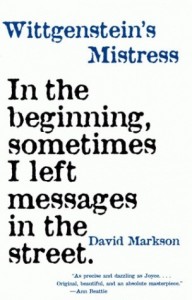Can Ramblings Make a Novel?
 Markson, David (1988). Wittgenstein’s Mistress. Champaign, Ill.: Dalkey Archive Press.
Markson, David (1988). Wittgenstein’s Mistress. Champaign, Ill.: Dalkey Archive Press.
This 250-page book is presented as the almost-stream-of-consciousness of a middle-aged woman who is the last living animal on earth. Unlike Joyce’s Ulysses, it is not a narrator’s record of a supposed stream of consciousness, but rather, a putative journal. The journal is not quite stream-of-consciousness, because one cannot type as fast as one can think, and some self-editing is inescapable when writing. The device of having her thoughts be in journal form solves the timing problem that made Ulysses unconvincing as a genuine stream-of-consciousness.
The woman claims she was mad during certain times of her life, but her journal seems only loopy, showing the mental distortions of social isolation you would expect if you were the last person on earth. But perhaps she really is mad, alone in a beach house, self-secluded from normal society. Just because it’s in a journal doesn’t make it true, especially when the journal is a work of fiction. Such consideration does raise Wittgensteinian questions about the relations among thought, language, and world, but only by implication. Nothing like that is addressed in the book.
The woman writes about her past, her travels around the world, her interests in art and music. She is, or was, a painter. Being the last person on earth is no big deal to her; in fact she never mentions it. The reader infers it over time as we realize her travels around the world were in search of other humans. Finding none, she took shelter in the world’s great museums where she often burned picture frames for heat. Nearly all the great museums of Europe are mentioned, along with some superficial mention of the art contained in each.
So the book is not a post-apocalyptic thriller, alas. We never learn what happened to all the other people, or the animals. There are no birds, fish, or mammals. The botanical world is apparently unaffected, despite the absence of pollinators. There is no mention of bacteria or viruses. Presumably the woman is in perfect health. There are no corpses, and we don’t know when the big whatever happened, but the great cities are not bombed out or burned down. She drives around in cars found still to have gasoline in them, and keys, too, presumably. She eats canned food she finds in stores, still well-stocked.
When we meet her, she has given up her search for others, and types her diary for reasons unknown. Frustratingly, she has nothing to say about “what happened,” very little about who she is or was, and no thoughts on what it means to be the last person on earth; what it means for history, evolution, death, and life; what it means spiritually, morally, personally, or even practically. The central fact of her story means nothing to her.
Nor does she consider why she is writing a journal that no one will ever read. I wouldn’t do it. The nature of writing entails the possibility of a reader. Perhaps writing is her expression of hope, though it seems she has fully accepted being the last person. No interesting philosophical questions are raised, despite the book’s title. And she never was Wittgenstein’s mistress. He was gay. The title of the book signals that she is an unreliable narrator.
So what does she write about? Nothing. She has no thesis, no point to make, no story to tell. Instead, she rambles, reciting jumbled and incomplete memories of her travels, and of history, literature, and painting. No science, architecture, mathematics, jurisprudence, politics, ethics, psychoanalysis, religion, education, or popular culture. Just the arts, and name-dropping a few philosophers. She is fond of apocryphal anecdotes about Rembrandt, Brahms, and Homer.
The focus then is not on what she writes about, but on how she writes, and therefore, how she thinks. The book is really a portrait of a mind disintegrating, an accurate representation, I believe, as the mind is fundamentally social. There could be no Robinson Crusoe, in fact. An isolated human being would lose his or her mind rather quickly. Perhaps that’s why Defoe introduced Friday as an interlocutor to Crusoe. Unfortunately, watching a mind fall apart in inconsequential ramblings is not very interesting.
The woman seems to know her memory is faulty so the narrative is replete with irrelevant digressions, tedious repetitions, and annoying self-corrections. There is a praising afterword by David Foster Wallace, which should be a clue or warning for potential readers. The book is an interesting work of experimental fiction, but for my taste, empty of content.
